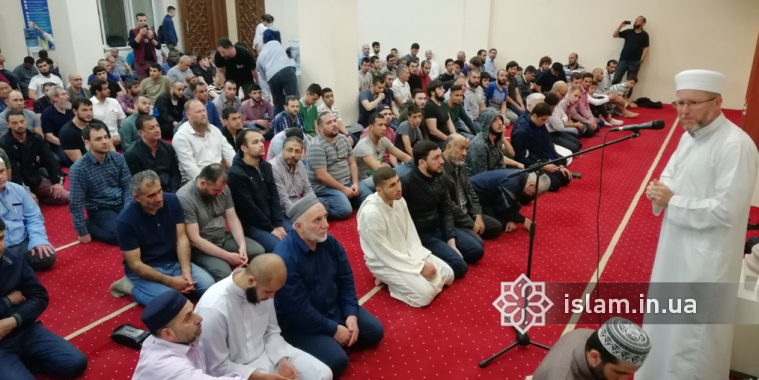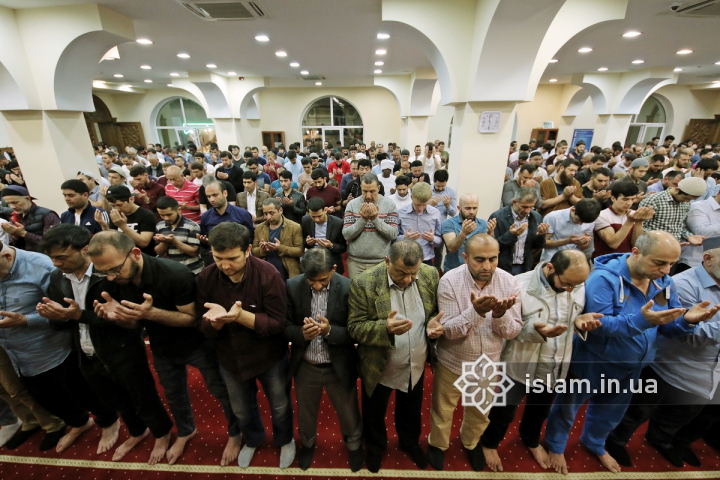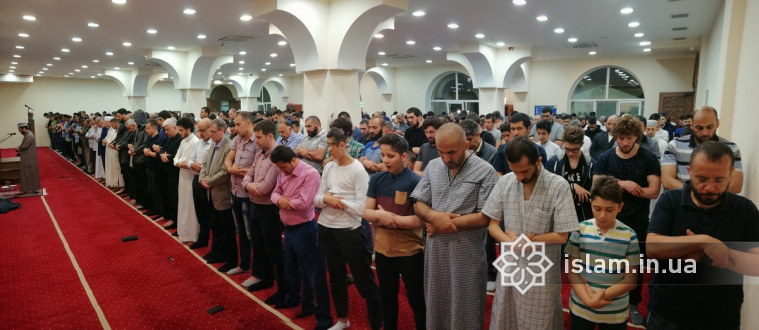In an exclusive interview, Dr. Said Ismagilov, Mufti of Religious Administration of Muslims of Ukraine “Umma”, spoke to Anadolu Agency on the current condition of Muslims living in Eastern Ukraine since the Russian occupation in 2014 and shared his impressions on Ramadan in the region.
Muslims faced constant persecution in Crimea
AA: As you know, a bloody war occurred in Ukraine. How were the rights of Muslims protected during the war?
As it is known, it’s been four years since the occupation of Crimea and the war in Eastern Ukraine. I would definitely say that this occupation and military aggression of Russia struck a powerful blow against a community of about 1 million Ukrainian Muslims. About 600,000 live in Crimea, Donetsk and Luhansk. These are Ukraine’s largest Muslim regions, with about 400,000 Crimean Tatars in Crimea and up to 200,000 Muslims of Volga Tatar descent and Ahiska Turks.
In terms of war, the Russian occupiers did not guarantee any rights of the Muslims. On the contrary, in Crimea, the Muslims unfortunately faced constant persecution, were being arrested, kidnapped and murdered. They faced systematic violations of their rights and freedoms, including being prohibited from holding gatherings to mourn [the dead] and rallies marking the anniversary of the deportation of Crimean Tatars every May 18. As the 74th anniversary of the deportation was marked this year, due to Russiahoccupation over 25,000 Ukrainian Muslims were forced to leave their homes and move to territories controlled by Ukraine, and a large community of Ahiska Turks was forced to move to Turkey.
Currently, all the internally displaced Muslims from the occupied territories have official IDP [internally displaced persons] status and the right to get social support in terms of special state programs. As for the Religious Administration of Muslims of Ukraine “Umma”, where I perform as Mufti, we always organize several charitable events per year in order to help the internally displaced Muslims. Last winter, we held our “Warm Relief” benefit in cooperation with the [German] Charity Fund Muslimehelfen and distributed humanitarian aid such as electric heaters, warm blankets, pillows and bed linen. Last summer, during Holy Ramadan, we also held a benefit for distributing a month’s volume of basic food products among the poor resettled families. Last autumn, during Kurban Bayramı (Eid al-Adha), we distributed korban meat among the resettled families. Briefly, I can say as the representative of Religious Administration in Ukraine, we do our best to inform the global community at the highest level as well as human rights organizations about all cases of persecution of Muslims in the occupied territories and also raise funds for the children whose fathers were imprisoned by the Russian occupational regime due to religious-based persecution.
Several Muslim leaders forced to leave Donbas
AA: How is the condition of Muslims in Ukraine? Is there any pressure on the Muslims in the region? Can you give any update regarding the situation?
In Ukraine, the condition of the Muslims varies from region to region. At the beginning of the occupation, there was pressure on Muslims living in Eastern Ukraine as well as on imams and Muslim community leaders. Some armed Russian mercenaries were raiding mosques in order to subdue the communities to the occupational administration. Several Muslim religious leaders, including myself, were forced to leave Donbas due to the persecution and unlawful imprisonment. The civil population and communities were demanded to be dominated by Russian authorities.
Since early 2016, the situation has become more or less stable. Still, every mosque is kept under close surveillance. Russia does not officially interfere much in the lives of the communities, which greatly differs from the situation in Crimea. As for the situation in Eastern Ukraine, local Muslim communities, due to a dramatic decrease in income, ---rather survive than have a normal religious life--. In the Luhansk region, all the religious communities [not only Muslim] are demanded to get a new registration in terms with the occupational administration.
'Powerful spiritual rise’ among Muslims in Ukraine
AA: We are observing the holy month of Ramadan. Could you please share your impressions of Ramadan in Kyiv ?
Firstly, I want to share some details from history to answer this question. In 1944, all of the mosques in Ukraine were destroyed. The official position of Islam was erased in the Ukrainian Soviet Republic after the deportation of Crimean Tatars. Yet there were some Muslims who were fasting during Holy Ramadan, burying their dead and praying secretly.
After Ukraine's independence, we gained the right to freely practice our religion, open mosques, as well as pray and fast without any fear. For that reason, it must be underlined that Ukraine is now on the edge of a religious renaissance with an increasing number of Muslims who have started to return to their religion each year after they gained independence and were treated equally as a Muslim. Therefore, I am very delighted to share this information that each Ramadan, more Muslims join us to fast in Ukraine. During the summer months, the daylight hours are very long in Ukraine. As you know, in Kyiv, Muslims fast up to 18 hours per day in the summer heat while continuing to perform their professional duties. However, that does not stop our Muslim community, who endured 70 years of chest-thumping atheism and a severe ban on Islam. We now finally feel the joy of our faith, as we deserve religious freedom. Therefore, Muslims in every city gather for the joint iftars to break their fast and tarawih prayers. These gatherings happen even in places where there is not a single mosque nearby because of a lack of money to build it. In such cases, with the aim of being together in a peaceful atmosphere, the Muslims rent some rooms or gather at private homes so they can share the blessings and the joy of Ramadan.
Undoubtedly, Ukrainian Muslims experience a powerful spiritual rise which is why Ramadan in Ukraine is full of joy, brotherhood and strong faith in Allah’s help and support. Unfortunately, in the occupied territories of Ukraine, the situation is not that much joyful but rather grieved and uneasy. In order to feel the spirit of Ramadan in Ukraine, I invite everyone to the Kyiv Islamic Cultural Centre’s mosque to witness what a Ukrainian Ramadan is like. Every Ramadan is really a good chance for us as our Holy Prophet Muhammad (peace be upon him and his progeny) said: "Surely, the month of Ramadan has been named so because it scorches away the sins". I truly believe that it is also a great chance to really enlighten the world that peace is central to Islam and therefore Ramadan as a Holy month of the Islamic religion is a month of solidarity and helping each other create a peaceful atmosphere all over the world.
Source: AA





